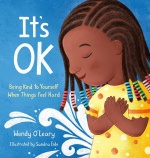Three Simple Ways For Kids To Grow Their Self-Compassion
January 13, 2024
Quote of the Week
"Compassion for others begins with kindness to ourselves." --Pema Chodron
Three Simple Ways For Kids To Grow Their Self-Compassion
 When we practice self-compassion, we treat ourselves with the same kindness that we would offer a friend when things go wrong. This includes soothing ourselves when we struggle and motivating ourselves with kindness. Whereas a habit of self-criticism increases anxiety and depression, adolescents who practice self-compassion become less anxious and depressed. Self-compassion helps kids cope better with challenges and experience more well-being and self-esteem.
When we practice self-compassion, we treat ourselves with the same kindness that we would offer a friend when things go wrong. This includes soothing ourselves when we struggle and motivating ourselves with kindness. Whereas a habit of self-criticism increases anxiety and depression, adolescents who practice self-compassion become less anxious and depressed. Self-compassion helps kids cope better with challenges and experience more well-being and self-esteem.
But just how do we help kids to develop an inner self-compassionate voice? Here are three ways to do that: Be the voice you want your kids to internalize. The way we talk to kids makes a big difference in how kids talk to themselves. When kids have repeated experiences of being validated and cared for, the external support can become internalized as an inner self-compassionate voice. Research suggests that when parents are supportive and empathic, their kids learn to respond to themselves with kindness. Meanwhile, parents who are critical of their children are more likely to have kids who are self-critical. Model self-compassion. Sometimes parents think that they are supposed to model “having it all together” for their children. Ironically, kids who see “perfect parents” aren’t being equipped with the skills they need to cope with their own imperfections. Children need caregivers who are appropriately vulnerable with their struggles and model self-compassion. This could be as simple as naming that we are having a hard day and that everyone sometimes struggles like us. Playfully teach and compassionately scaffold kids' compassion practice. For caregivers who would like to teach children self-compassion–related habits, it’s helpful to begin by learning and embracing our own habits around feelings. Read more in this week's featured article from Greater Good magazine.
Reading Corner
 Title: It's Ok: Being Kind To Yourself When Things Feel Hard
Title: It's Ok: Being Kind To Yourself When Things Feel Hard
By: Wendy O'Leary
Recommended Ages: 3-7
"This sweet book teaches children the simple and profound power of self-compassion through simple affirmations that can be repeated when things are hard. All too often kids get down on themselves when they experience things that make them sad, angry, guilty, or jealous. It’s amazing how powerful it can be to move past a difficult emotion when we think about all the other people feeling that same way and show ourselves some much needed kindness. The main story is followed by 10 exercises focused on ways to develop self-compassion, such as Kind Voice, Kind Body, Kind Touch, and Hugging Breath."
--Publishers
Be the Change
The Feelings Habit Animal Quiz provides a great way to start a conversation about kids' current feeling habits: Do you hide feelings (chameleon), explode with feelings (bear), obsess about feelings (beaver), or feel ashamed of feelings (deer)?





